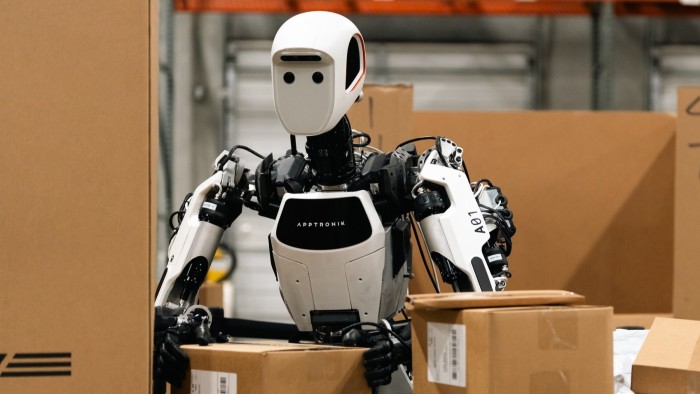Stay informed with free updates
Simply sign up to the Artificial intelligence myFT Digest — delivered directly to your inbox.
The world’s biggest annual event showcasing the latest in personal technology this week was awash with devices from televisions, cars and even washing machines — all infused with generative artificial intelligence.
At the Consumer Electronics Show in Las Vegas, tech companies including US giants Google and Amazon, as well as South Korea’s LG and China’s Hisense exhibited new AI-powered products and services in the latest sign of how the transformative technology is upending the global industry.
The scene was set by Jensen Huang, chief executive of Nvidia, the $3.5tn chipmaker whose stock has risen more than 150 per cent over the past year on the back of huge sales of its market-leading graphics processing units needed to power advanced AI models.
During a keynote address in which he unveiled an array of new products including a new mini AI supercomputer and a suite of foundational AI models on its new Cosmos platform, Huang told an audience of over 6,000 delegates that AI was advancing at an “incredible pace.”
“It started with perception AI — understanding images, words and sounds. Then generative AI — creating text, images and sound,” he said, saying next comes an era of “physical AI, AI that can proceed, reason, plan and act”.
Those advances are expected to be featured in an array of products over the coming year, following the smartphone sector’s major push into AI, with Apple, Samsung and Google all rolling out major new redesigns in 2024.
In the automotive sector, Amazon announced that its Alexa voice assistant, upgraded with large language models, will appear in some BMW vehicles. Semiconductor group Qualcomm also revealed new industry partnerships for its AI technology platform for cars that promises voice assistants and driving aids powered by large language models.
Meanwhile, LG and Samsung announced they are adopting Microsoft’s AI co-pilot for their TVs, while Google announced it is integrating the company’s Gemini AI assistant into its TV operating system.

Small companies also revealed more niche products, such as wearable-technology group Halliday, which unveiled lightweight glasses with a built-in AI assistant, seeking to take on Meta’s bestselling Ray-Ban smartglasses.
Among the more outlandish exhibits was a “modular flying car” costing “below $300,000” from China’s Xpeng AeroHT, in which a foldable aircraft can be unleashed from the back of futuristic truck. Japanese drinks maker Kirin showed off a favour-enhancing electronic spoon that sends a small electric current to the tongue to provide the sensation of additional saltiness.
But it was Nvidia’s Huang who created the biggest stir. Samsung’s stock rose 3 per cent on Wednesday after the Nvidia chief said he was confident the Korean group would be able to solve technical issues that have hit its production of high-end memory. Samsung’s shares lost those gains and traded down over subsequent days.
Shares in quantum computing companies such as Rigetti Computing, IonQ and D-Wave Systems also fell sharply after Huang said that the wait to create “very useful quantum computers” remained more than 15 years away.


The Nvidia chief was far more bullish on robotics, predicting a “multitrillion-dollar” opportunity from the company’s AI chips powering everything from self-driving cars to factory robots.
Apptronik, a company that uses Nvidia’s robotics hardware and software which announced a collaboration with Google’s AI lab DeepMind in December, displayed its “Apollo” robot. The “general purpose” humanoid device, which the company hopes to sell at a price point of around $50,000, is designed to operate in a wide range of workplaces, from warehouses to elder care homes.
“Generative AI works very well on these types of robots,” chief executive Jeff Cardenas told the Financial Times, saying it opened the door to more advanced reasoning and capabilities.
“What you want to do is just drop a robot into an environment where it can do one task, and then it can get a software update and go and do the next task,” he said.

Despite the week’s enthusiasm over AI, some analysts said many consumers remained wary about the technology, due to issues around safety and reliability.
Bank of America analysts wrote on Friday that demand for consumer AI products had so far “generally been lacklustre.”
“Most consumers are looking for a reason to say no,” said Patrick Moorhead at Moor Insights & Strategy, partly because “there aren’t many ways to experience generative AI yet for consumers”.



